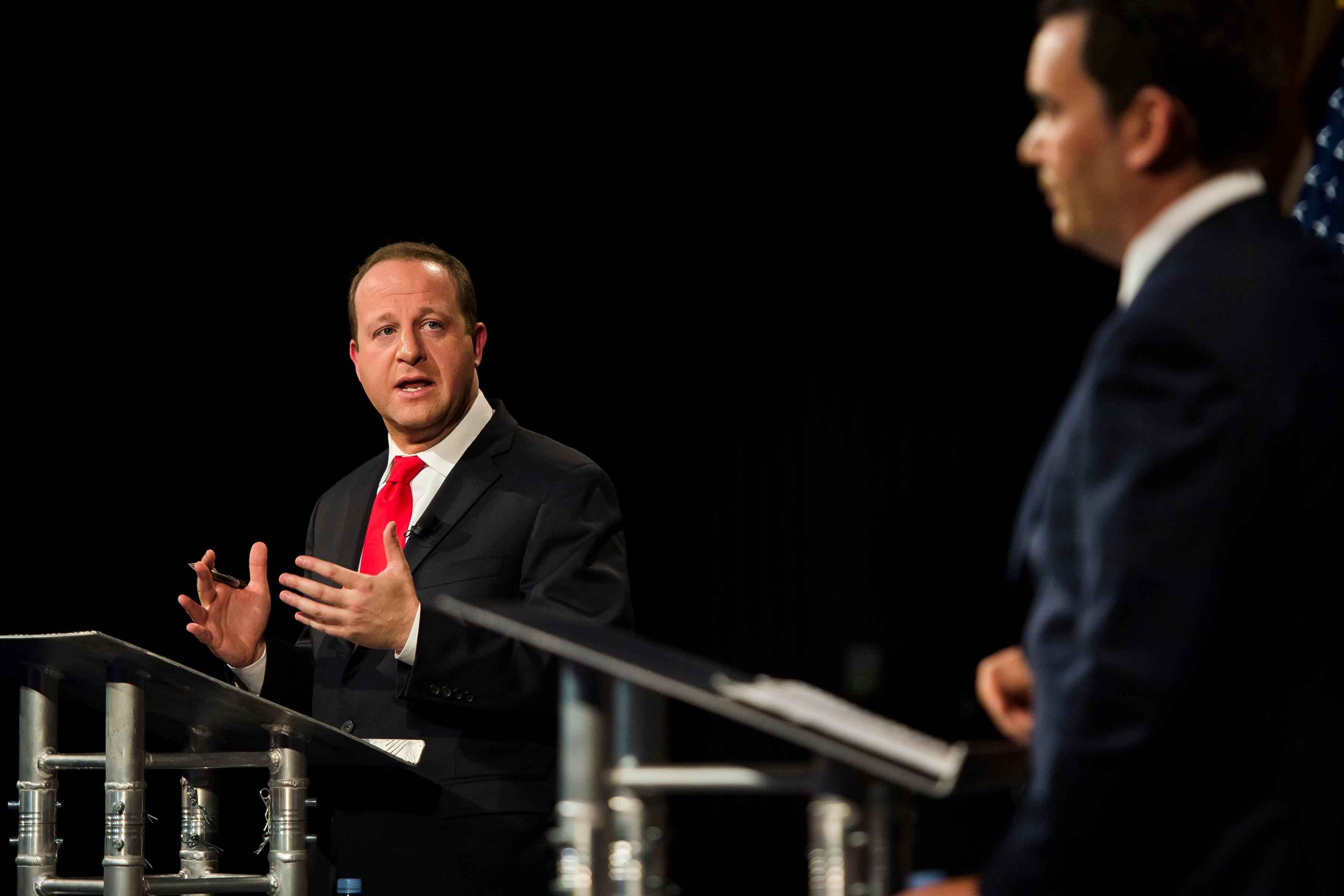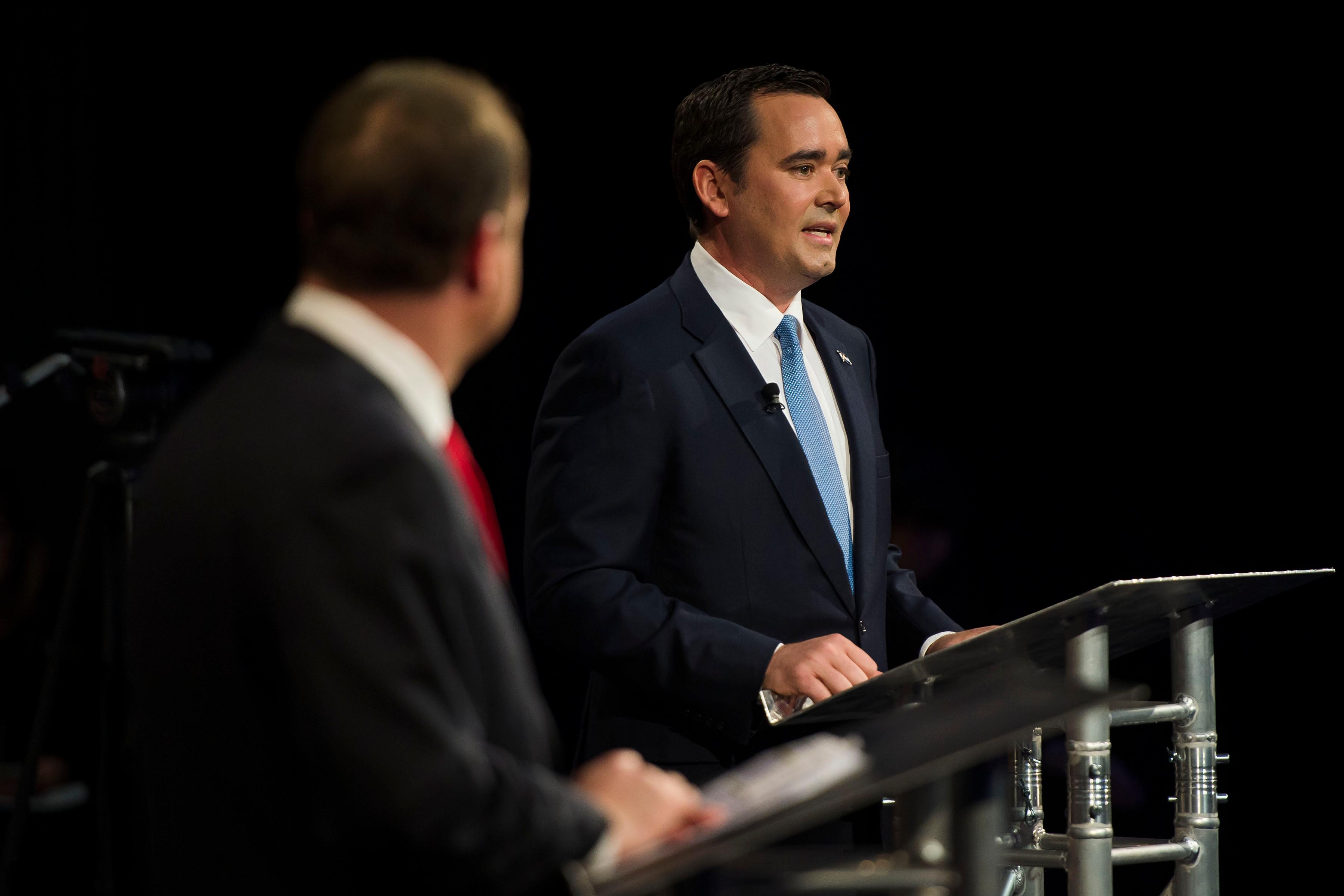We’re five debates deep in the governor’s race in Colorado. At this point, Jared Polis and Walker Stapleton are used to seeing each other’s faces under bright lights and hearing each other’s barbs.
So it was only natural to ask when the two met at Colorado State University on Wednesday’s night for their sixth debate: What, if anything, were we likely to learn? Turns out they still had some new material to share during the debate sponsored and moderated by 9News and the Coloradoan.
We learned almost immediately when the pair first met earlier this month that Stapleton was going to be on the offensive. That was pretty much the case on Wednesday, though Stapleton likely had added motivation. A poll released earlier Wednesday showed he’s lagging behind Polis, who continues to talk and walk like the favorite.
So, on to meat and potatoes. Here are three things we learned from Wednesday’s debate.
Polis won’t say whether he thinks Rep. Jovan Melton should drop his reelection bid, while Stapleton used the question to mention a separate incident involving Polis.
Some major figures in Polis' party have called for Melton to drop out of the race after past domestic assault charges surfaced this month. Others have defended Melton. Melton pleaded guilty to one of the charges involving harassment while charges for misdemeanor assault were later dismissed.
Polis hasn’t directly suggested Melton drop out, and instead continues to suggest that the decision is up to the voters. He added his issue with Melton is that Polis felt he wasn’t open about what happened.
“As a person of faith, I believe in redemption. I also believe in consequences," Polis said. "I'm not sure that he's being entirely open now in coming to terms with the past.”
Polis said Melton should “consider resigning or coming clean,” and be fully open, adding that he’s not sure “all the allegations have come to light” against Melton. He said he wouldn’t endorse anyone in the race for Melton’s seat, including the Republican opponent.
Stapleton used the occasion to more or less call Polis a hypocrite, citing a 1999 police report involving a dispute between Polis and a disgruntled employee. That report, and misleading political advertisements about it that have been pulled by at least one network, have been repeatedly fact-checked. Stapleton repeatedly brought this up, though Polis was considered the victim in the incident by police. Stapleton's return to the 1999 incident during the Melton question caused a bit of a fracas, with moderator Kyle Clark making it clear there were two completely different incidents (Melton was charged; Polis was not).

"It is inexcusable to ever forcibly push a woman, regardless of the circumstances," Stapleton said. "Inexcusable. And I asked Congressman Polis last Saturday when it was revealed that Representative Melton was found guilty of assault on a woman if he would join me and Democratic leaders of his own party in asking Representative Melton to step down and he would not do it.”
Polis and Stapleton offered some ideas about higher education and jobs training.
Coloradoan politics reporter Nick Coltrain asked two reader questions. One was about Colorado passing laws that would make attending college for free, while another asked how the state can balance its higher education responsibility with skilled labor training. The higher-ed question was based on the Excelsior Scholarship available in New York and makes college attendance free for middle-class students.
Stapleton said he would love to make college free, but said he's not quite sure how that would work. Rather than making things free, Stapleton said he would support income-sharing agreements that allow people to get skills training and pay back the training with a portion of their salary.
"I think what we need to do in the state of Colorado is invest more in skills-based training, especially in areas of the state where we have failing public schools,” Stapleton said.
Polis wants to help students save money by looking at open-source textbooks that could prevent spending hundreds of dollars for books.
“We need to make sure we can consolidate administrative expenses to streamline the cost across the university system to pass these savings along those students,” Polis said.
Polis said economic prosperity means figuring out the kind of programming and educations students are getting in high school and vocational skills to align them to the state's workforce needs.
"A high school diploma alone isn't enough to have a great job in a rapidly-evolving 21st-century economy," Polis said. He said four-year degrees are one way to help prepare students, but it can also include skills certification and apprenticeship programs.
Stapleton said higher education has been "getting dinged" because it's an area of the state's budget that isn't constitutionally protected.
"That means when we have a flat year or dealing with a recession, that higher education gets raided to pay for other things," Stapleton said. "I want to make sure that doesn't happen anymore. I want to make sure that we fully fund higher education and skills-based training in Colorado."
Doing this will only be done by keeping a "vibrant economy" in the state, Stapleton said.
Can Stapleton call out President Trump over some of his offensive remarks on women and minorities? Nope.
Stapleton has no plans to distance himself from President Trump. While he’s disagreed with the president about tariffs, when asked about whether he would refute some of the offensive language Trump has used against women — he called Stormy Daniels “horseface” in a tweet on Tuesday — and minorities, Stapleton wouldn’t budge.

"President Trump's personality has nothing to do with who will be Colorado's next governor and what I have supported are policies that will benefit Coloradans which is why I was one of the earliest supporters of, as you know, of the president’s tax plan,” Stapleton said.
If federal policies are misguided, he will defend Coloradans. Stapleton said by and large, Trump’s policies have benefited residents here and returned more money to them.
When pressed by Clark about not treating people poorly, Stapleton said, "As grating as to some as it may be, or others may find it amusing or appealing, but the thing is, what are the policies?"
When can we do it again?
The two are scheduled to a part in another televised debate on Oct. 23 at the Universtiy of Denver. It will be sponsored by The Denver Post, KMGH-Denver7 and DU.













